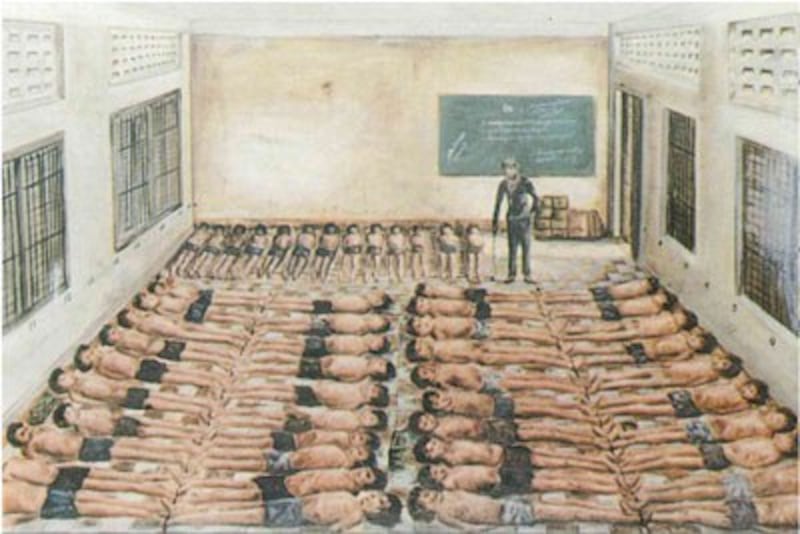Vann Nath, a noted Cambodian artist who survived the Khmer Rouge's torture and execution center by painting portraits of its brutal leaders, died on Monday aged 66, his family said.
Vann Nath, whose paintings later exposed to the world the horrific torture committed by the hard-line communist movement between 1975 and 1979, had been battling kidney and lung ailments for several years.
He fell into a coma late last month after suffering a heart attack, his immediate family members said.
"He had been long suffering from kidney failure and lung disease," his son, Vann Chanarong, said. "My father died around 12.45pm [Cambodian time]."
"His death is going to be a huge loss for Cambodia's history," his son-in-law, Lon Nara, said.
Vann Nath's grieving widow, Kith Eng, said his chronic illnesses stemmed from the torture he suffered at Tuol Sleng or S-21 prison, where around 15,000 people were killed as the Khmer Rouge sought to eliminate perceived enemies of the revolution.
Vann Nath was the first of the survivors of the prison to testify before a U.N.-backed tribunal trying members of the Khmer Rouge regime on war crimes charges.
Eating beside corpses

[ >>See the slideshow: Verdict Recalls Gruesome AbusesOpens in new window ]
He described at a hearing in 2009 how hunger drove him to eat insects, saying he and others at the prison also ate food beside corpses of starved fellow prisoners.
"The conditions were so inhumane and the food was so little," Vann Nath told the tribunal, as he broke down in tears. "I even thought eating human flesh would be a good meal."
Following his testimony, the tribunal sentenced the overseer of the Tuol Sleng prison, Kaing Guek Eav, also known as Comrade Duch, to 30 years in prison last July for crimes against humanity, torture, and premeditated murder.
Vann Nath survived Tuol Sleng prison due to his painting skills, as he was forced to produce portraits of Pol Pot and other Khmer Rouge leaders, escaping what was known as the "Killing Fields."
Vann Nath's death leaves only two surviving Tuol Sleng prison inmates.
"He should have waited to see if justice was done at the trial of the Khmer Rouge leaders," said Chum Mey, 80, one of the two survivors. "He should not have passed away without knowing the truth yet."
“Van Nath had painted and drawn many pictures about the S-21 prison for the younger generation," Chum Mey said.
Timely reminder
Neth Pheaktra, spokesman for the Extraordinary Chambers in the Courts of Cambodia (ECCC), as the tribunal is formally known, said Vann Nath's death was a "huge loss" to the tribunal as it forges ahead with its hearings.
"He was an important witness of the trial."
Hong Kim Soun, civil party lawyer of the ECCC, said Vann Nath's death is a timely reminder for the tribunal to speed up its hearings.
“The trial has been delayed and the victims are dying one by one," he said. "And by comparison, the accused persons have been receiving more support for health and security or safety than the victims.
"Even though there are so many victims that make the court impossible to provide such security support, a prolonged waiting for justice, to see that justice is done, is almost useless for those who died before the court gets its job done.”
Vann Nath, born in 1946, was trained as an artist but had to work at a cooperative farm after the Khmer Rouge seized power in April 1975.
He was accused of being an enemy of the regime in 1978 and imprisoned at Tuol Sleng, and kept there until January 1979 when the regime fled ahead of invading Vietnamese troops, who found only seven inmates alive at the prison.
He later painted images of torture and wrote a memoir of his year spent there.
The Khmer Rouge's radical policies left up to two million people dead through overwork, disease, malnutrition, and execution.
Reported by RFA's Khmer service. Translated by Sum Sok Ry. Written in English by Parameswaran Ponnudurai.
